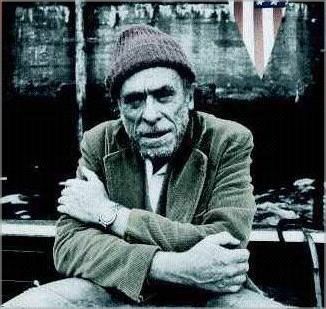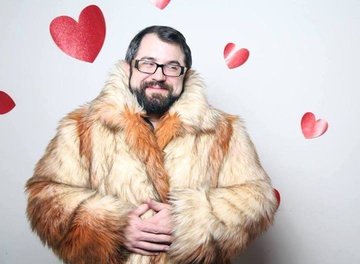A guest post by Jason Fabeck, who lives in Chicago and is currently writing a book while trying desperately to match his socks.
when it is truly time,
and if you have been chosen,
it will do it by
itself and it will keep on doing it
until you die or it dies in you.there is no other way.
-Charles Bukowski
Before you ask, the answer is yes. I titled my first piece after a Bukowski poem. I decided to take a risk and quote a famous writer. But guess what? That’s what writers do: take risks. We wear hats! We have relationship problems! We own dogs with dead celebrity names! Now, you say, “So do I. And I’m not a writer.” Well, you might just be. The first rule of becoming a great writer-human is to know that you are capable of being one. Sounds silly but I really think it starts as simple as that.
 I’m relatively new to this game, so I won’t shell out expert advice, but if you’re looking for a few beginner tips and tricks, stay with me. The rest of you can go back to modding Skyrim. Once you’ve established that, yes, I am a writer, you have to actually write something. Easy enough, right? But what to write about? Literally anything. See that honorary street sign with someone’s name on it? Write a short biography on them for practice. We live in a great era for research work. Google their name and start digging. While you won’t create any epic masterpieces right off the bat, you will get some practice in one of the most important parts of writing a story.
I’m relatively new to this game, so I won’t shell out expert advice, but if you’re looking for a few beginner tips and tricks, stay with me. The rest of you can go back to modding Skyrim. Once you’ve established that, yes, I am a writer, you have to actually write something. Easy enough, right? But what to write about? Literally anything. See that honorary street sign with someone’s name on it? Write a short biography on them for practice. We live in a great era for research work. Google their name and start digging. While you won’t create any epic masterpieces right off the bat, you will get some practice in one of the most important parts of writing a story.
Character Development
You can have the best idea for a plot in the world but if the characters aren’t fleshed out (and become mostly extensions of your own personality), your story will fail. It reminds me of an old film school rule: If it sounds like shit, it won’t matter how good the shot looks. The characters are the sound of your story while the world you create is the visual aspect. My writing partner provided me with a great exercise recently. Interview your characters. Write out 40-50 life questions (ex. What is their biggest fear? How do they handle stress?) and answer them all–as your character. That’s the most important part. You want to bring your own style, but you don’t want your aged heroin-addicted trapeze artist to talk just like you do.
World Building
The next thing you should be focusing on is one of my favorite parts. You get to create a world. A whole, big (or small) world that has anything you want in it. It can have things that already exist (pizza!) or that are completely made up (a Tileft, which is a rabbit with a moustache, of course). This is the key to how your characters are going to interact. Underwater? In space? Only by blinking? Creating a world for everyone to live in is also what helps move your plot along. Your protagonist can’t get from A to Z without going somewhere in between. Start small with big ideas. What kind of world is it and what does it look like? What are the names of some of the places in your world?
Coming up with the actual names and titles of these people and places can sometimes be the most frustrating part. Trying to mold a perfect name for everything will drive you insane. Find something suitable and if it’s not right, your brain-mush will organically come up with something for it later. Trust me. Simple but large open-ended questions like this are what will get you rolling on some of the more miniscule elements of your story.
Writing the Damn Thing
Now that you’ve got unique characters (with names) and places for them to go (that also have names!), you’ve got to somehow squish all these ideas floating behind your eyes into sentences that people will want to read. The main idea here is to start writing. Just write. Then write some more. Take a break. Wash your clothes since it’s probably been days at this point. Write some more. Once you get the handle of getting words onto paper, feel free to edit as you go. But when you are starting out, it’s better to get rolling and go back later. The key here, like most anything that takes practice, is to shake all the mediocrity out so you can learn to become good.
Even a week after I looked back on something I wrote, I knew what I could try in order to improve it. So while practice may not make perfect for everyone, you should at least be able to identify if the thing you wrote was horrible or not. That’s the second rule of becoming a great writer: Hating every single thing you write. But that’s why you keep doing it. To someday, somehow, make something that even you can be proud of.





